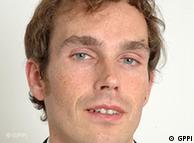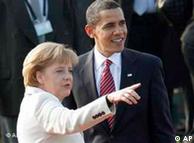Opinion: From Miss World to world leader?
This Tuesday, the German chancellor, freshly anointed for a second term, will speak before the US Congress in a deeply symbolical event: an East German woman on the eve of the 20th anniversary of the fall of the Berlin wall addressing the parliament of the world's superpower - the first German leader to do so since Germany's first post-war chancellor, Konrad Adenauer. The pictures will go around the world and into living rooms across Germany.
It will be a perfect Merkel moment making her rivals in the cabinet back home look like political dwarfs.With this domestic victory assured, Merkel will be tempted to play it safe by giving a merely symbolic speech. She could invoke the gift of freedom that America helped to bring to West Germany and later also to the East.
For good measure, she could throw in a few hazy words about "networked security" and the need to combine political, development, police, cultural and military measures in cases such as Afghanistan - of course without offering any specifics on means, ends and capabilities. In the end, this speech would amount to little more than the new Foreign Minister Guido Westerwelle's call for the removal of the remaining few US nuclear weapons from Germany's pristine soil: pure symbolic politics, just on a grander stage.
A broader vision
However well-received at home in Germany, such a speech might well fall flat in the US and the broader world stage. Unlike in the beginning of her first term, for "Miss World" to be a credible world leader it is no longer enough to just be the anti-Schroeder (her predecessor as chancellor): a little more measured and less populist. The US and Germany's other partners expect Merkel to articulate a clear vision for Germany's and Europe's role in the world. This requires honesty and farsightedness.
Merkel should be honest in the sense of spelling out the shortcomings and failures of the past 20 years. She should clearly state that we underestimated the challenges of the post cold-war era. In our enthusiasm for the newly found freedom and the hopes for a "new world order," we were unprepared for the viciousness of ethnic chauvinism, the persistence of regional conflicts, the spread of an ideology of hatred against the West, the recklessness of casino capitalism, the task of rebuilding states and societies in faraway places, and the magnitude of global challenges - be they energy and climate or pandemics.
We overestimated our readiness to follow through on international commitments we undertook, from the Millennium Development Goals to the protection of civilians in armed conflicts.We underestimated how quickly new powers would enter the global arena and what we would have to invest in order for global institutions to keep up with the times. It also took us too long to realize that while yesterday's transatlantic alliance was all about Europe, today's and tomorrow's transatlantic relationship has to be fully global in outlook.
 Bildunterschrift: Großansicht des Bildes mit der Bildunterschrift: Thorsten Benner
Bildunterschrift: Großansicht des Bildes mit der Bildunterschrift: Thorsten Benner
Merkel needs to be farsighted and determined to convince the German and European public to join President Barak Obama in his call for global leadership: "Now is the time to build new bridges across the globe as strong as the one that bound us across the Atlantic."
Merkel should promise to work toward increasing Germany's and Europe's commitment and capabilities. This involves convincing a reluctant and weary public to question long-held beliefs and habits - in short to prepare for the "shared sacrifice to meet the challenges of the 21st century" that Obama has called for. Climate change and energy are a prime example. Here Merkel took on a leadership role early on speaking out on the need to act (even advocating the same per capita allowance to emit for every citizen of the world). However, convincing the public that business as usual is no longer an option is the hard part, preventing special interests from torpedoing her agenda even harder.
Strategic challenges
Merkel's finest challenge will be to bring Germany's and Europe's strategic outlook in line with global realities. What happens in Pakistan can severely affect our security - whether through Europeans training to become terrorists back home or ethnic Beluchis destabilizing a near-nuclear Iran.
To address these challenges, we need a strong EU, both civilian and military and in both rhetoric and reality. It is high time once and for all to debunk the false choice between a strong NATO and a strong EU. Rather, it is only with a strong EU pillar that NATO will be effective in the future - a fact that the US has clearly recognized over the past 10 years. We also need to do away with the false choice of either standing up for our values or engaging with rising powers such as China. The simple fact is that unless we turn countries with very different political trajectories into joint stakeholders of the global system, we will fail to address today's most pressing challenges.
Merkel's place in the history books was assured from day one of chancellorship simply by being the first woman and East German in the job. Whether Merkel's reign will be associated with any substantial achievements is still in her hands. Contributing to making the world safe for a multipolar age is an achievement worth striving for - even without having been preemptively awarded the Nobel Peace Prize. It requires courage and vision - not least to convince a reluctant German and European public. High time to get started.
Thorsten Benner is co-founder and associate director of the Global Public Policy Institute (GPPi), a European think tank in Berlin.
Editor: Rob Mudge/ DW


No comments:
Post a Comment